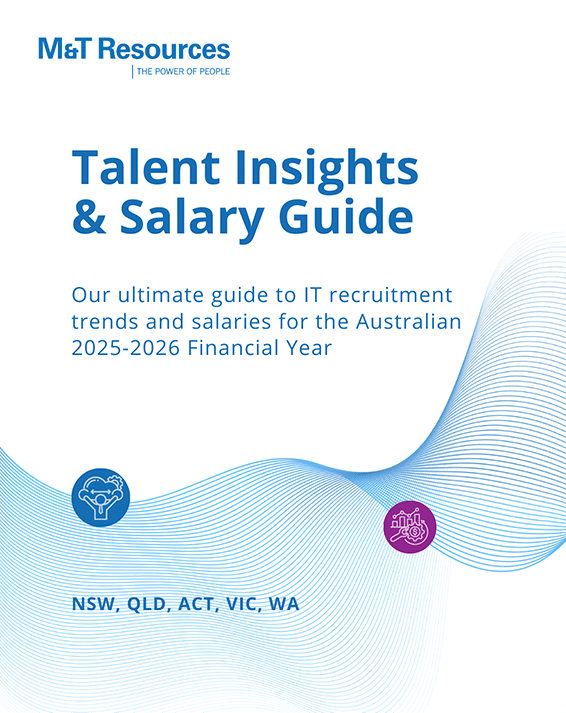Salary Guide FY25-26
M&T Resources Talent Insights & Salary Guide FY25-26

M&T Resources Talent Insights & Salary Guide FY25-26
If there’s one thing you can count on in the Australian technology sector, it’s that nothing stays still for long.
Australia is entering an era where change is the new normal. Digital acceleration and cost pressures are pushing employers to be more selective when it comes to hiring, while the prevalence of AI is reshaping the workforce, reducing headcount in some roles and shifting demand to others.
Our Talent Insights & Salary Guide provides insights to detailed salary benchmarks across IT roles and provides all the information you need to navigate this new market landscape. Whether you’re rethinking your workforce strategies or planning your next career move, this guide will show you exactly what’s changing and what it means for you.
National Insights
While the tech sector is changing, what change looks like varies widely across the country.
Victoria and New South Wales are grappling with fiscal pressures and hiring pauses, while Queensland and Western Australia are seeing job growth and sustained economic activity.
Some large-scale trends still emerge when we look at Australia as a whole. For employers, hiring has become a more targeted process, with tighter criteria and a tilt toward multi-skilled people who can add value across teams.
For employees, upskilling in AI has become one of the surest ways to stay ahead; those who pair it with cloud, DevOps, cybersecurity or data skills, plus strong stakeholder communication stand out.
Key Trends FY25-26
- Cost-conscious transformation: Employers are looking for candidates who can deliver a measurable impact, rather than just maintain systems.
- AI-led restructuring: Less investment in operational and support areas, more in transformation, data and platform enablement roles.
- Candidate expectations: Hybrid and remote work have become non-negotiables for many; roles that align with personal values are also seeing strong demand.
There’s also good reason to be optimistic about salary growth.
The easing of interest rates, in addition to the government focus on wage growth and job security, are reassuring signs. Salaries are likely to see a subtle but positive rebound, buoyed by increased competition across the public and private sectors.
Get more tech talent insights and the latest salary figures for FY25-26 in our latest guide.
Complete the form below to receive your copy.
FY25-26 Talent Insights & Salary Guide
State-by-state Snapshots

New South Wales
New South Wales (NSW) has grown into the most selective market where ICT talent is concerned and the state most affected by government policy.
After widespread hiring pauses in 2023 and an oversupply of contractors, employers have pivoted back towards permanent hires. This is good news for candidates seeking stability, and those with skills in DevSecOps, platform engineering, data science and test automation will be a particularly hot commodity.
The Albanese Government’s skilled migration reforms played a huge role in driving demand. It’s meant tighter access to overseas talent and more pressure for NSW employers to find qualified, local candidates. This is in addition to the new national privacy and online safety reforms, which has made professionals with expertise in compliance, data ethics and regulatory design even more valuable.

Queensland
Queensland entered 2025 with solid momentum and now it’s moving into a phase of strategic consolidation.
It’s not slowing down so much as it’s preparing for the future. Employers are taking a more considered approach to workforce planning, and while demand is still strong, the bar has been raised where technical skills, stakeholder engagement and public sector experience is concerned.
There are clear reasons for this. National programs are flowing through to Queensland in the form of major state-aligned projects in energy, transport and digital policy; getting state infrastructure ready for the 2032 Brisbane Olympics is a key initiative. As a result, government clients are looking for candidates with the necessary ‘soft skills’ to navigate complex projects.

Australian Capital Territory
Like many of the states, the Australian Capital Territory (ACT) has seen a shift away from contractors and towards more permanent roles.
This is especially true where the Australian Public Service is concerned, with a push to convert contractors into long-term hires. And while demand remains high in the public sector, this has been tempered by tighter budgets and greater cost scrutiny.
Again, we also see ‘soft skills’ as an important value differentiator—and a key driver when it comes to this shift towards permanent roles. Employers increasingly require staff with stakeholder management experience, especially when a role involves policy implementation, citizen services or complex cross-agency delivery.

Victoria
Victoria (VIC) took longer than the other states to bounce back after the COVID-19 pandemic. As a result, the job market also took a bit longer to recalibrate.
That recalibration is now well and truly underway. The previous advantages that candidates held—high demand, remote-first work and favourable rates—are starting to fade. Economic pressure and a high state debt have also spurred government departments to push for leaner teams.
However, there are still plenty of silver linings for candidates. Public sector roles remain a cornerstone of stable employment, employers continue to hire for secure, long-term positions and new demand is emerging for AI Engineers, Data Scientists, Technical Project Directors and a multitude of other roles. In short? Opportunities are still strong.

Western Australia
Western Australia (WA) is experiencing a steady transformation, one that will see it develop into a future-focused hub for science and technology.
A variety of government initiatives, from the Future Made in WA Fund to the 10‑Year Science and Technology Plan, are being deployed to build the state’s digital and tech capacity. As a result, we are seeing a more diverse economy emerge—one with a greater demand for skills in DevOps, data engineering, cybersecurity and machine learning.
The state is also seeing new startups and scale-ups emerge, especially in AI, battery manufacturing and digital optimisation. And as WA becomes a cleantech and critical minerals innovation zone, the demand for tech roles that support these industries will only grow.
It’s an incredibly positive outlook, and one that should have anyone with expertise in cybersecurity, cloud platforms or AI very excited.
